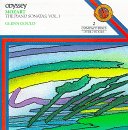| All Artists: Mozart, Gould Title: Piano Sonatas 1 Members Wishing: 0 Total Copies: 0 Label: Sony Release Date: 1/14/1991 Genre: Classical Styles: Forms & Genres, Sonatas, Historical Periods, Classical (c.1770-1830), Modern, 20th, & 21st Century Number of Discs: 2 SwapaCD Credits: 2 UPC: 074644561227 |
Search - Mozart, Gould :: Piano Sonatas 1
 | Mozart, Gould Piano Sonatas 1 Genre: Classical
|
Larger Image |
CD Details |
CD ReviewsSinewy interpretations! Hiram Gomez Pardo | Valencia, Venezuela | 10/13/2005 (4 out of 5 stars) "Glenn Gould with his inimitable style and original temperament recorded the who set of these sonatas that define a broad succession of stages in Mozart 's life. First at all, Gould has sublime peaks worthy readings but never will let you down. Along this set are worthy to mention the following: Sonata No. 1 in C major KV 279 which finds in Gould a fabulous interpreter. The exultant Allegro and a glorious and surprisingly futurist Andante, admirably phrased and carefully performed. The Third Sonata is remarkable, specially with The Andante Amoroso. The Sixth Sonata is one of the best achievements of the whole set. Gould acquires this kind and naïve approach filled of charm and imagination, so typical of the aristocratic nuance and freshness. The Theme with Variations is simply exquisite; Gould links every one of the Variations, conferring them its own specific weight. The Seventh Sonata is played with majestic austerity. Gould almost makes a very use of the pedal, avoiding a percussive or even expansive sound. Somehow this Sonata No. 8 K. 310, marks for the first time a visible attempt to enrich with a major gamut of emotions the kind spirits; we can note the evident growing up process in Mozart. His Allegro with spirit is almost a Pre Beethovenian statement. The Andante cantabile shows ancient traces of Haydn, but due the clever process of gradual modulations Mozart changes the character and emphasizes the tragic mood. Then he returns to the opening theme to load the hall with gentle charm. This work is one of my favorite ones. It 's lovable and very embellished theme that constitutes by itself a clear "jump to the future". Note for instance the reaffirmation of the tragedy in the cantabile line, through the hasty and nervous phrasing that carves in relief the weird premonitions around the imminent presence of the Death. Gould reaffirms with absolute refinement and supreme conviction this KV. Respect to the Sonata No. 10 KV 330, Gould makes an uncanny pronouncement about it, trying to demystify the gallant mood, but perhaps seeking the bitter side of the work, there is a sensitive loss of grandness and intimacy specially in the Andante Cantabile. You should remember my kind reader, this was precisely, the chosen encore fro Daniel Barenboim in the famous Berlin Concert on November 12 1989, jus three days after the wall 's fall. I prefer by far his Salzburg version of 1958. " Glenn Gould being himself serialist | OR | 12/07/2002 (5 out of 5 stars) "This album is not orthodox Mozart. But who is buying Glenn Gould if they care about that? Glenn Gould publicly admitted that he didn't think Mozart was a very good composer. He even admits that a couple of the Mozart Sonatas he felt absolutely no convition about, and that he only recorded them to finish the set. Nevertheless, these recordings are a lot of fun to listen to. The virtuosity is astonishing, and the odd perspective on the music is refreshing. Some of them (the third movement of K331 for example) are so off the wall that you feel certain he must be joking. This is classic Gould work, quirky and unembarrased. I give this five stars because it's a great picture of the performer, not the composer." A new Mozart O. Torres | Chicago, IL | 06/20/2000 (5 out of 5 stars) "Although Mozart purists may not appreciate the irreverant interpretations by Glenn Gould, it certianly provides new insight into these well worn pieces. In many places, his performances completely change the conception of the music. That alone makes this worth having - it isn't another faithful run through, but a rethinking of these works by Mozart. Surely, his lack of fondness for Mozart shows, but I think it contributes to the excellence of these performances. This is Mozart as composer equal with performer. These are good."
|

 Track Listings (18) - Disc #1
Track Listings (18) - Disc #1